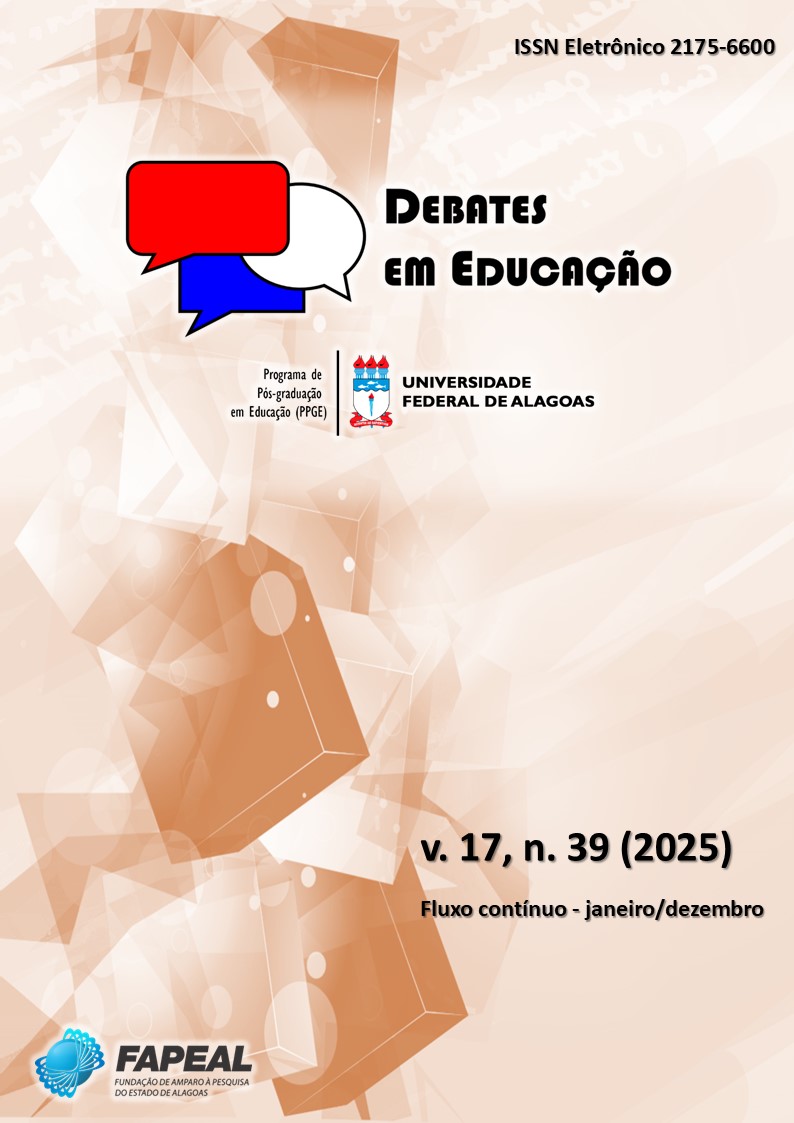Does equity exist in mathematics?
The inclusion of a student with ASD
DOI:
https://doi.org/10.28998/2175-6600.2025v17n39pe17275Keywords:
Equidade, Educação matemática inclusiva, Transtorno do espectro autistaAbstract
Building a democratic school space has been a major challenge for educators fighting for inclusive mathematics education. In this article, we analyze how the inclusion of a student with ASD in a regular elementary school classroom occurs. The study is an excerpt from the master's thesis and its research methodology is a case study, using interviews, audio and video recordings and participant observation. We analyzed the school inclusion process of a student with ASD from the perspective of equity. We conclude that it is necessary to engage teachers with the class to include all students and work with teaching resources in mathematics classes and that it is also necessary to know the student's real level of knowledge and try to improve the concepts that the student has, also respecting the ways in which the student thinks and sees mathematics.
Downloads
References
BOALER, J. Promoting ‘relational equity’ and high mathematics achievement through an innovative mixed‐ ability approach. British Educational Research Journal, Oxfordshire, v. 34, n. 2, p. 167-194, 2008.
BOGDAN, R. C.; BIKLEN, S. K. Investigação qualitativa em Educação. Uma introdução à teoria e aos métodos. Tradução de M. J. Alvarez, S. B. Santos e T. M. Baptista. Porto: Porto Editora, 1994.
DALVANG, T. THe COmpass model: Apossible tool for dialogue,reasoning and understanding the situationin which learnes experience difficulties in mathematics education. Mexico: ICME 11, 2008).
DINIZ, Debora. O que é deficiência? São Paulo: Brasiliense, 2008.
FARIAS, J. A. F; SANTOS, R. M. B. Proposição de ações metodológicas para inserção das Dimensões de equidade nas aulas de matemática. ReBECEM: Revista Brasileira de Ensino em Ciências e Educação Matemática. Cascavel, (PR), v. 2, n. 3, p. 387-410, dez. 2018.
GERVASONI, A.; LINDENSKOV, L. Students with ‘Special rights’ for Mathematics Education In: ATWETH, B. et al. Mapping Equity and Quality in Mathematics Education. New York: Springer, 2011.
GUTIÉRREZ, R. Context matters: how should we conceptualize equity in mathematics education? In: EISENMANN, B. H. et al. (Eds.). Equity in discourse for mathematics education. Dordrecht: Springer, 2012. p. 17-33.
GOFFMAN, E. Estigma: notas sobre a manipulação da identidade deteriorada. Tradução de Mathias Lambert. Rio de Janeiro: LTC, 1988.
FERREIRA, M. E. C. GUIMARÃES, M. Educação Inclusiva. Rio de Janeiro: DP&A, 2003
JOAS, Hans. A sacralidade da pessoa: nova genealogia dos direitos humanos. São Paulo: Editora Unesp, 2012.
KRANZ, C. R. Os jogos com regras na perspectiva do desenho universal: contribuições à educação matemática inclusiva. 2014. 290f. Tese (Doutorado em educação) Universidade Federal do Rio Grande do Norte, Natal-RN, 2014.
MANTOAN, M. T. E. Inclusão escolar: O que é? Por quê? Como fazer? São Paulo: Moderna, 2006.
ORGANIZAÇÃO DAS NAÇÕES UNIDAS (ONU). Convenção sobre os direitos das Pessoas com Deficiência, 2006.
SOUSA, José Jorge de. Mediação lúdica no transtorno do espectro autista: Desenvolvimento de conceitos científicos algébricos. 2020. 145f. Dissertação (Programa de Pós-Graduação em Ensino de Ciências e Educação Matemática - PPGECEM) - Universidade Estadual da Paraíba, Campina Grande, 2020.
Downloads
Published
How to Cite
Issue
Section
License
Copyright (c) 2025 Debates em Educação

This work is licensed under a Creative Commons Attribution-NonCommercial 4.0 International License.
Neste tipo de licença é permitido Compartilhar (copiar e redistribuir o material em qualquer suporte ou formato) e Adaptar (remixar, transformar, e criar a partir do material). Deverá ser dado o crédito apropriado , prover um link para a licença e indicar se mudanças foram feitas . O conteúdo não pdoerá ser utilizado para fins comerciais .
Atribuição-NãoComercial 4.0 Internacional Creative Commons Attribution 4.0 (CC BY-NC 4.0).


